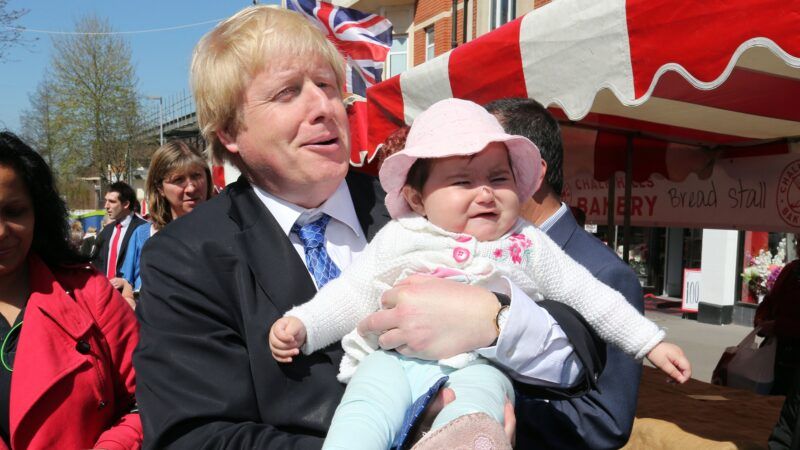Boris Johnson Taxes the Young To Pay for the Old
The highest tax burden in a generation confirms the Conservative Party has no interest in small government.

The most successful prime minister in the post–World War II United Kingdom turned the country around by, as she put it, "rolling back the frontiers of the state." That was Margaret Thatcher, and if it wasn't already clear that Prime Minister Boris Johnson is engaged in a very different project from the Iron Lady, confirmation came last week in the form of an announcement on health and social care.
Johnson has created a new taxpayer-funded entitlement to social care (residential care, in-home health care, and other forms of assistance for the elderly and infirm) and has boosted funding for the National Health Service (NHS), Britain's taxpayer-funded, free-at-the-point-of-use health care system. Under the new system, care will be subsidized for anyone with assets up to $170,000. No one, however wealthy he may be, will ever have to pay more than $120,000 on care over his lifetime. Once that threshold has been reached, taxpayers will foot the rest of the bill.
To pay for all of this, Johnson is squeezing another $16.5 billion out of U.K. workers by imposing a 2.5 percentage point increase on the total payroll tax (1.25 percent from an employee and 1.25 percent from the employer)*. A tax on shareholder dividends will also rise by 1.25 percentage points. In doing so, Johnson is breaking an election promise not to raise taxes and confirming that the days of small-state conservatism are long gone. After the changes come into effect, the U.K. will have the highest tax burden since 1950. When the only higher-tax post-war government than Johnson's was the radical, industry-nationalizing administration of Clement Attlee, you know something, somewhere, has gone very wrong with the U.K.'s Conservatives.
But few expect even this substantial rise to come close to paying for the full set of promises of care Johnson has made. As the nonpartisan Institute for Fiscal Studies (IFS) warned, "both spending and tax will ratchet upwards over the next few years. Taxes will reach their highest sustained level in the U.K."
If Johnson's tax grab is confirmation of his party's ideological drift, it is also the latest indicator of who the government prioritizes, and who it doesn't. In decision after decision, Johnson has put the interests of affluent Baby Boomer retirees over those of younger generations.
Dominic Cummings, Johnson's former chief adviser, was characteristically blunt about the latest move: "Tell your friends," he tweeted. "The Tories are making the young — who can't get a house & working for average/below average income, already screwed by a decade of hapless Tory government — to work harder to subsidise older richer people. They promised to do the opposite."
An anonymous government minister was similarly unhappy with the policy, complaining to the Sunday Telegraph that the policy was a "tax raid on supermarket workers and nurses so the children of Surrey [a leafy, affluent county near London] homeowners can receive bigger inheritances."
The numbers support the dramatic language. According to the IFS, just 2 percent of the new tax increase will be paid for by seniors and two-thirds will come from households with earners aged under 50. Unlike income from work, pension income will not be taxed at a higher rate.
The tax trend is toward more and more revenue being raised from work income and consumption, and less and less from wealth and property. Meanwhile, government spending in the U.K. is increasingly dominated by the NHS juggernaut. According to analysis by the Resolution Foundation, 40 percent of day-to-day state spending is now on health. Ten years ago it was 28 percent. As the government makes more and more health and social care promises to an aging population, that figure is all but certain to rise further.
As with paying for social care, so too with housing. The government had been planning the biggest shake-up to the country's zoning laws since 1946. Hardworking young Brits who struggle with high housing costs stood to gain the most from the changes. But the promised "yes in my backyard" (YIMBY) overhaul that offered the possibility of more affordable housing has been scuppered by a Boomer backlash. Fearful of doing anything to jeopardize the wealth accumulated by seniors who have seen the price of their homes soar, a government that has frequently talked of the injustice and economic harm of expensive housing is now doing next to nothing to solve the problem.
In a strange reversal of the U.K.'s normal party political divides, Labour Party Leader Keir Starmer responded to Johnson's social care plan by saying that the Conservatives "can never again claim to be the party of low tax." He's right. Instead, on social care, housing, and much else, the Conservatives have made clear that they are the party of complacent Boomer affluence.
Correction: This piece previously described the tax hike as a 1.25 percentage point increase. The correct number is 2.5 percentage points.


Show Comments (33)